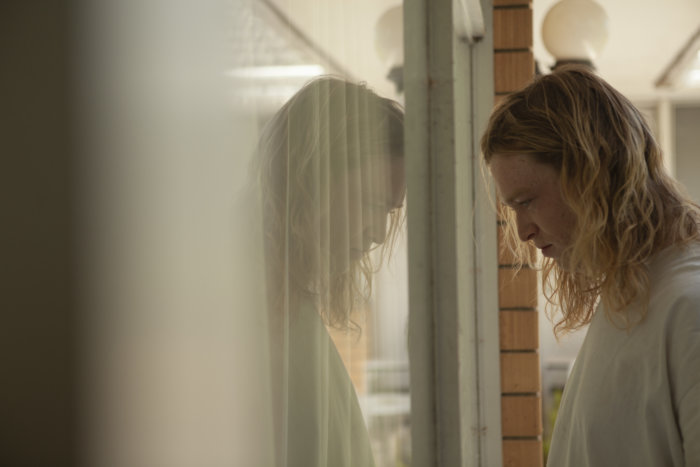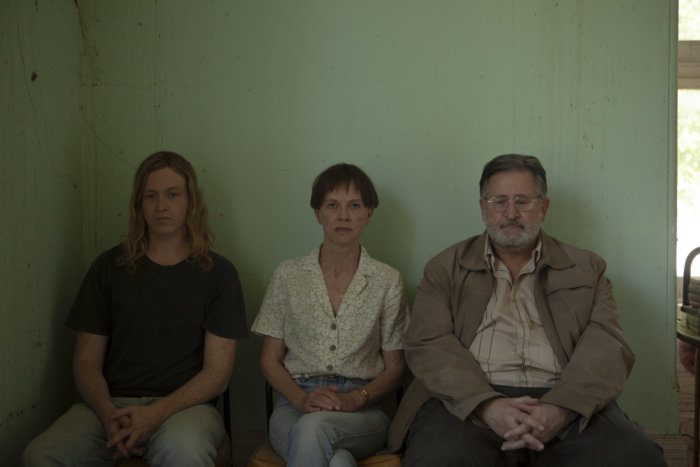The devastating events that unfolded on April 28 and 29, 1996 in Australia have left a lasting impact on the way the whole continent has thought about gun control. The Port Arthur mass shooting is a story that has haunted those who lived in and around Port Arthur, Tasmania for decades, and making a film about the event has certainly had its moments of hesitation. But for director Justin Kurzel, reading Shaun Grant’s script provided him with a way to tell a story about one of the darkest moments in Australia’s history. And it’s done with honesty, and a chilling resonance on how people can react to the world around them.
That’s also what motivated actor Caleb Landry Jones to sign on with ‘Nitram.’ The Texas native knew snippets of what happened years ago, but more so about its lasting effect. After reading the script and about his character (his role as the shooter and his family are never named on purpose), the compelling nature about violence and choices that lead up to it stayed with him. The mass shooting is never shown, but the chilling nature of what happened beforehand is—and it’s been his most challenging role to date.
Caleb Landry Jones sat down to discuss more on the painful event the film is centered around, which can be used as a warning signal for our future—no matter where you live, or who you know.

What initially interested you about this film?
The script, and then meeting Justin [Kurzel] and Shaun [Grant]. Justin tried to make me understand the seriousness of the project, trying to relate to me in a way… and I felt that it would be something that is maybe a bit more than what has [been asked of me] from before. This was a filmmaker that was not only aware, but I believed in that moment, was going to some degree to go to the ends of the Earth to achieve it, you know? Whatever that was for himself. And that his version of hard was maybe a different version than some of the people I’ve worked for in the past—and it was. The script was a beautifully written script about a family and about this young man, and his relationship with a woman, and choices…seeking out all the time for connection, to be a part of something—the world around him—and not being able to.
You mentioned this role pushing and challenging you. What were some of the most challenging aspects for you then about this experience?
The reality of the film and what he [Justin] needs from the actor. There’s no room for bullsh*t. Every scene is: what is the scene about? What are we doing? Trying to always get at the heart of everything all of the time. I was allowed, because of the character, to be very unaware of this at times, or could joke around more than I should or be inappropriate. In the situation, that was something that was maybe practical to me, in order to play [him]—but, the weight and the pain, his pain, is there all of the time. There’s nothing light in it, even when it’s light. There’s something that you don’t really get to escape in all the way… it gets taken from you.
Did you do anything to prepare for ‘Nitram’?
[I worked] with a dialect coach for about three months once or twice a week—she retrained my tongue. Other that that, it was Justin giving me a lot of material…whether if it was activities, whether it was things to think about, or music, or films, or TV that the Tazmanian fellow would have seen at that time. Or whatever it is from the culture that I know nothing about. I think it was more in the activities and some of the ways, perspectives that I needed to find for myself for the character that he let me do. So then it felt like I knew the character better than anyone else. As the film progressed, I knew more and more what to do and more and more what the correct reaction [was] all the time, or my feelings towards this or that…and I think [that] Justin has a really magical way of having a firm hand over everything, and yet, you’re given all this space. I think there’s something very delicate to how he does this—more headf*cking or mind-stuff, where to me, it was just the best experience as an actor making this film and working in this way.

What would you tell audiences to expect when it comes to your character and what unfolds on screen in the film?
Over the film, he’s becoming more and more isolated from any reality. I think there’s this idea with the camera that I like so much when he talks about who he sees inside the camera, and this detachment…there’s a stroke for me about awareness, about how aware is the character all of the time? By the time we were done, the character is fully aware, and suddenly it’s not a family drama anymore and it’s not this story about a young man and his mom and dad and a woman. For me, as an actor, you get a different place in it than everyone else who is making it. While I’m doing it, the gravity is there and it’s not there all at the same time. It’s not there in ways it should be for someone who’s in their right mind. But I think in a film, there’s a constant struggle for trying to identify, to be a part of something and constantly not being allowed to. The film is this man who keeps [going in] just a straight line in a way of a descent.
‘Nitram‘ will be released in theaters, on digital rental, and on AMC+ on March 30.
































